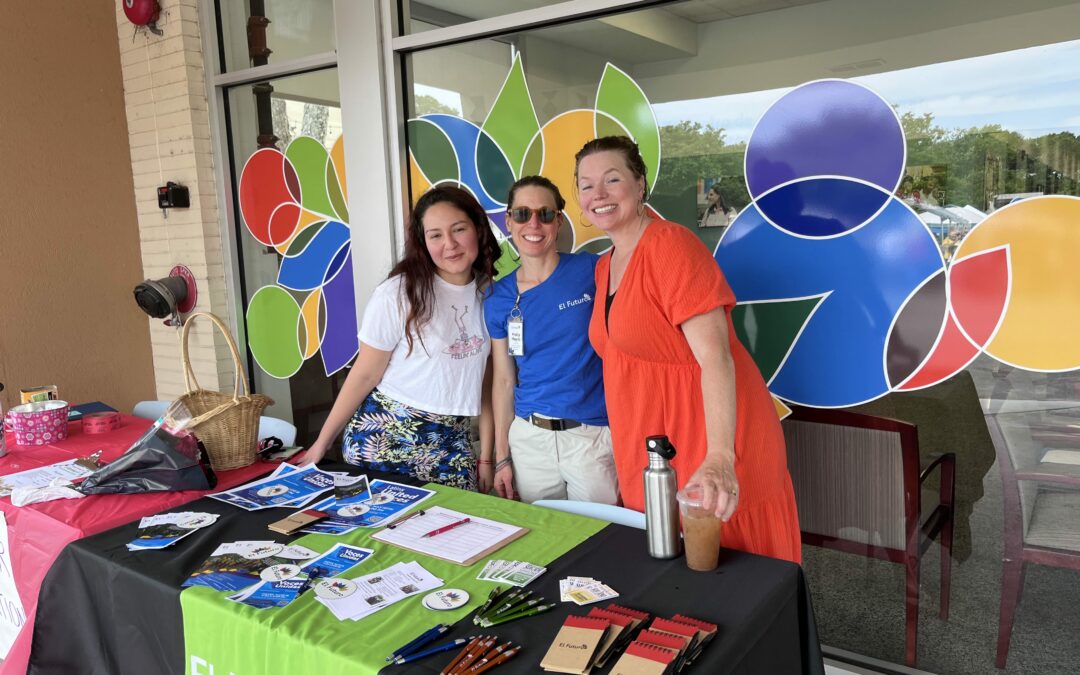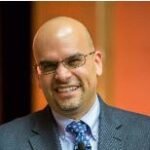El Futuro’s Mentes Fuertes Program Offers Accessible Mental Health to the North Carolina Latino Community
El Futuro, a cornerstone of support for North Carolina’s Latino community, stands at the forefront of mental health advocacy. Central to our mission is Mentes Fuertes (Strong Minds), a groundbreaking initiative developed in collaboration with UNC Greensboro and Massachusetts General Hospital, that premiered in Orange County, NC. This program embodies the ethos of community-driven healing, addressing the unique mental health access challenges faced by Latinos through the innovative Community Mental Health Worker Program.
Addressing Mental Health in the Latino Community
Within the Latino community, the demand for mental health services is critical. Mentes Fuertes recognizes the disparities in access and outcomes stemming from systemic trauma, cultural insensitivity, socioeconomic factors, and acculturation stressors including discrimination. However, despite growing awareness, stigma and language barriers persist in many mainstream mental health models, hindering many people from seeking help.
Offering Community-Driven Mental Health Support
El Futuro extends care into the community and reduces barriers to access through the Community Mental Health Worker program. Community Mental Health Workers undergo rigorous training to provide vital one-to-one support tailored to the community’s needs. This program fills a crucial void, offering free, culturally-responsive mental health support exclusively in Spanish for adults aged 18 and above, expanding the workforce which suffers a critical shortage of bilingual, clinically licensed mental health professionals.
Mentes Fuertes empowers community health workers to improve Latino community mental health outcomes by tapping into the health workers’ existing rapport and cultural insights. Equipped with comprehensive training, Community Mental Health Workers help community members with symptoms of depression, anxiety, and PTSD learn skills to improve their mental well-being.
Our team of four CHWs has already screened 83 people from two counties in NC in the first five months of this pilot effort. In this short amount of time, the clients who have completed the full series of 10+ skills-building classes have already seen significant clinical improvement, with rates of depression and anxiety decreasing significantly over the course of the treatment.
The impacts are perhaps best summed up in the words of the participants themselves:
This program helped me to reduce my stress, depression and anxiety, it helped me recognize and discard thoughts that do not bring me anything positive.
I learned to take better care of myself, to value myself, and to be good with others. I learned breathing strategies that help me every day, and also techniques to better manage my thoughts.
Additionally, participants are able to receive care from within and among their community of familiarity, reducing stigma and building trust. Hosted in familiar settings, like collaborative nonprofit community agencies or faith-based communities, Mentes Fuertes maintains a communal atmosphere that fosters trust and engagement. By prioritizing linguistic accessibility and cultural relevance, the program ensures no one is left behind in their journey toward healing.
What You Can Do To Support Extended Latino Mental Health Services Through Culturally-Responsive Community Mental Health Workers
Collaborative advocacy approaches that involve mental health providers, local Medicaid administrators, faith community leaders, and Latino community leaders can result in shared agendas and stronger commitments to effective solutions for mental health disparities.
Community mental health workers from within the local community can be the strongest voice of comfort and encouragement for Latino individuals who are fearful of seeking support. Provide platforms for community mental health workers to share their experiences and insights with the public, and ensure compensation for representation in these arenas.
Community mental health workers require training and support to achieve community mental health outcomes while maintaining their own well-being. Be sure to consider support for ongoing training, coaching, and support to reduce burnout among these important care extenders.
Consider global health models like “friendship benches” and “promotoras de salud” when designing community mental health worker initiatives.
Follow El Futuro on social media and share with your networks. (@ElFuturoNC)
El Futuro’s Mentes Fuertes Program embodies the power of community-driven solutions in mental health care. Through this innovative initiative, barriers are broken and lives are transformed.
Read this article at Giving Compass


 Alvely Alcántara, LCSW
Alvely Alcántara, LCSW Rossy C. Garcia, MEd
Rossy C. Garcia, MEd  Katy Sims, MD
Katy Sims, MD  Everardo Aviles, LCSW, LCAS (Eve)
Everardo Aviles, LCSW, LCAS (Eve) As a medical anthropologist and social work researcher, Dr. Gulbas’ research embodies interdisciplinarity through the integration of applied theories of health and human development with qualitative and ethnographic methodologies. Her work seeks to understand how people—children, families, and providers—navigate complex sociocultural landscapes in the pursuit of mental health. Most of her work, to date, focuses attention on developing more robust interpretations of suicide risk. With funding from the National Institutes of Mental Health, this body of research has contributed to advancements in theoretical and empirical knowledge of the broader contexts within which youth suicide risk is situated.
As a medical anthropologist and social work researcher, Dr. Gulbas’ research embodies interdisciplinarity through the integration of applied theories of health and human development with qualitative and ethnographic methodologies. Her work seeks to understand how people—children, families, and providers—navigate complex sociocultural landscapes in the pursuit of mental health. Most of her work, to date, focuses attention on developing more robust interpretations of suicide risk. With funding from the National Institutes of Mental Health, this body of research has contributed to advancements in theoretical and empirical knowledge of the broader contexts within which youth suicide risk is situated.  R. Gabriela Barajas-Gonzalez is a developmental psychologist and an assistant professor of Population Health at NYU Grossman School of Medicine. Dr. Barajas-Gonzalez is the principal investigator of a study that examines the impact of immigration-related threat and stress on school communities. She earned a PhD in developmental psychology from Columbia University and hold a BA in human biology from Stanford University. Dr. Barajas-Gonzalez is the daughter of Mexican immigrants and a first gen college student.
R. Gabriela Barajas-Gonzalez is a developmental psychologist and an assistant professor of Population Health at NYU Grossman School of Medicine. Dr. Barajas-Gonzalez is the principal investigator of a study that examines the impact of immigration-related threat and stress on school communities. She earned a PhD in developmental psychology from Columbia University and hold a BA in human biology from Stanford University. Dr. Barajas-Gonzalez is the daughter of Mexican immigrants and a first gen college student. Dr. Parra-Cardona is an Associate Professor in the Steve Hicks School of Social Work (SHSSW) at the University of Texas at Austin. At the SHSSW, he serves as Coordinator for Mexico and Latin American initiatives. He also serves as Area Director for Research at the UT Austin Latino Research Institute. Dr. Parra-Cardona’s program of research is focused on the cultural adaptation of evidence-based parenting interventions for low-income Latinx populations in the US and Latin America.
Dr. Parra-Cardona is an Associate Professor in the Steve Hicks School of Social Work (SHSSW) at the University of Texas at Austin. At the SHSSW, he serves as Coordinator for Mexico and Latin American initiatives. He also serves as Area Director for Research at the UT Austin Latino Research Institute. Dr. Parra-Cardona’s program of research is focused on the cultural adaptation of evidence-based parenting interventions for low-income Latinx populations in the US and Latin America. Bianka Reese, PhD, MSPH is a research scientist and program evaluator specializing in adolescent and young adult sexual and reproductive health. Her previous research in the experiences of Latinx LGBTQ+ youth stems from her work as the Research and Evaluation Manager at SHIFT NC (Sexual Initiatives For Teens), where she led largescale evaluations of multilevel, community-based sexual health promotion initiatives and research projects aimed at elevating the voices of diverse youth in North Carolina. Dr. Reese is currently the Senior Research Strategist at Creative Research Solutions, LLC, an award-winning national evaluation, research, and assessment firm.
Bianka Reese, PhD, MSPH is a research scientist and program evaluator specializing in adolescent and young adult sexual and reproductive health. Her previous research in the experiences of Latinx LGBTQ+ youth stems from her work as the Research and Evaluation Manager at SHIFT NC (Sexual Initiatives For Teens), where she led largescale evaluations of multilevel, community-based sexual health promotion initiatives and research projects aimed at elevating the voices of diverse youth in North Carolina. Dr. Reese is currently the Senior Research Strategist at Creative Research Solutions, LLC, an award-winning national evaluation, research, and assessment firm. Tania Connaughton-Espino, MPH is an independent researcher focused on adolescent and young adult sexual and reproductive health. Her interest in the experiences of Latinx LGBTQ+ youth stems from her previous work with SHIFT NC (Sexual Initiatives For Teens), where she led the training and evaluation department, conducted capacity-building workshops for youth serving professionals including on the topic of how to be more affirming of LGBTQ youth, and from her extensive experience working with the Latinx population in NC.
Tania Connaughton-Espino, MPH is an independent researcher focused on adolescent and young adult sexual and reproductive health. Her interest in the experiences of Latinx LGBTQ+ youth stems from her previous work with SHIFT NC (Sexual Initiatives For Teens), where she led the training and evaluation department, conducted capacity-building workshops for youth serving professionals including on the topic of how to be more affirming of LGBTQ youth, and from her extensive experience working with the Latinx population in NC. Maru Gonzalez, EdD is an Assistant Professor and Youth Development Specialist in the Department of Agricultural and Human Sciences at North Carolina State University. Her areas of inquiry include youth development with a focus on activism, social justice, and the experiences of LGBTQ+ young people across familial, school, and community contexts.
Maru Gonzalez, EdD is an Assistant Professor and Youth Development Specialist in the Department of Agricultural and Human Sciences at North Carolina State University. Her areas of inquiry include youth development with a focus on activism, social justice, and the experiences of LGBTQ+ young people across familial, school, and community contexts.  Nayeli Y. Chavez-Dueñas, PhD
Nayeli Y. Chavez-Dueñas, PhD Hector Y. Adames, PsyD
Hector Y. Adames, PsyD